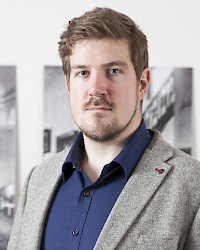Vita
From 2014 to 2020, Christoph Eggersglüß was a researcher at the Internationales Kolleg für Kulturtechnikforschung und Medienphilosophie (IKKM, International Research Institute for Cultural Techniques and Media Philosophy, Bauhaus-Universität Weimar) and associate member of the Laborgruppe Kulturtechniken (Laboratory Group Cultural Techniques, Universität Erfurt). He studied European Studies (Politics, Sociology, Cultural History, Law), Science and Technology Studies, and Media Culture in Bremen, Gothenburg and Weimar. From 2011 to 2013, he was a doctoral fellow of the DFG Graduate Research Training Group “Mediale Historiographien – Media of History/History of Media” (Erfurt-Jena-Weimar). Among others, Christoph was a founding member of the editorial board of the journal eject – Zeitschrift für Medienkultur (eject – Journal for Media Culture) and a participant in the Anthropocene Curriculum at the Haus der Kulturen der Welt (HKW) in Berlin. In recent years, he made numerous research visits to the holdings of the AA and the RIBA in London.
His doctoral project An/Architecture engages the history and theory of material infrastructures, with a special focus on how the common (street) bollard changed modes of producing and governing space, i.e. the life between buildings. Working on the intersection of media, technology and architecture, his research interests and publications include projects on the technopolitics of ‘security by design’, the theory of non-human delegates, the mundane historiography of critical infrastructures, urban anthropotechnics and surfaces, tinkering, circuit bending, effect pedals und stompboxes, field recording, as well as the history and historiography of bollards and street furniture.
Fields of Research
History and Theory of Cultural Techniques
Media Historiographies
History and Theory of Infrastructures
Political Action and Delegation
Sound Studies and Documentary Media
Publications
Aufsätze
Orthopedics by the Roadside – Spikes and Studs as Devices of Social Normalization, in: Jörg Dünne/Kathrin Fehringer/Kristina Kuhn/Wolfgang Struck (Hg.). Cultural Techniques - Assembling Spaces, Texts & Collectives. Berlin/New York: De Gruyter 2020, im Erscheinen.
Mittel der Ortserschöpfung, in: Ilinx, Brachen, V/2020, im Erscheinen.
Ha-Ha, in: Markus Krajewski/Harun Maye (Hg.). Universalenzyklopädie der menschlichen Klugheit. Berlin: Kadmos 2020, S. 19-21.
Blumenkübelforschung, revisited, in: Philipp Goll (Hrsg.). Helmut Höge – Pollerforschung. Hamburg: adocs 2018, S. 411-422.
Die Straße runter – oben bleiben, in: Johannes Binotto (Hrsg.). Film | Architektur. Perspektiven des Kinos auf den Raum (Bauwelt Fundamente 160). Basel: Birkhäuser 2017, S. 78-105.
Agents of Subtopia. Stell(en)vertreter an Englands Straßenrändern um 1955, in: Friedrich Balke/Maria Muhle (Hrsg.). Räume und Medien des Regierens (Merz Akademie). München: Fink 2016, S. 56-80.
Soziale Härten. Ontographien des Platzierens, in: Christina Lechtermann/Stefan Rieger (Hrsg.). Das Wissen der Oberfläche – Epistemologie des Horizontalen und Strategien der Benachbarung. Berlin/Zürich 2015, S. 213-234.
Fassade, in: Marius Böttcher et al. (Hrsg.). Wörterbuch kinematografischer Objekte. Berlin: August 2014, S. 42-44.
Blumenkübelforschung. Zur Politik und Ästhetik randständiger und grenzwertiger Dinge, in: Horizonte – Zeitschrift für Architekturdiskurs, 8/2013, S. 125-130.
Wandverwertung mit Straßenreinigung, in: eject – Zeitschrift für Medienkultur, Zugabe/Beilage (Heft 2/4), 2/2012.
Bastlergeschichte(n), in: eject – Zeitschrift für Medienkultur, Anthropotechniken, 1/2011, S. 35-49.
Presse/Radio/Ausstellungen/Miszellen (Auswahl)
Verfahrensfreie Schutzhütten – Tag 24, in: Martina Bengert/Jörg Dünne/Max Walther. Triakontameron, 26. April 2020.
Floating – Tinkering, Text für: Floating Utopias, nGbK Berlin, 27. April bis 24. Juni 2018.
Anti-Terror-Beton. Eine Objektbiografie des Pollers, in: WDR 3 Kultur am Mittag, 21. Dezember 2017, 07:13 Min.
Festwall – Anti-Terror-Poller, in: der Freitag, Nr. 50, 14. Dezember 2017, S. 27.
